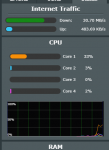Jack Yaz
Part of the Furniture
I seem to remember back when I used FreshJR version the check only looked for tc rules, but if iptables rules had wandered off it wouldn't reapply due to the logic test used. I hacked up the persistence check to make it always reapply instead of conditionally. I don't know if you improved how the check worked or not so thought I'd mention itLooking for feedback from FlexQoS users about whether the FlexQoS scheduled check at 3:30 AM ever does anything on your router. It doesn't on mine, suggesting it could be removed.
Please run the command below to search your syslogs for the nightly check and let me know if it ever doesn't say "No TC modifications necessary"
Bash:grep -E "^[A-Za-z]{3} [0-9]{1,2} 03:30:[0-9]{2} FlexQoS:" /tmp/syslog.log-1 /tmp/syslog.log
Code:/tmp/syslog.log-1:Oct 20 03:30:00 FlexQoS: /jffs/addons/flexqos/flexqos.sh (pid=5139) called with 1 args: -check /tmp/syslog.log-1:Oct 20 03:30:02 FlexQoS: No TC modifications necessary /tmp/syslog.log-1:Oct 21 03:30:01 FlexQoS: /jffs/addons/flexqos/flexqos.sh (pid=31067) called with 1 args: -check /tmp/syslog.log-1:Oct 21 03:30:02 FlexQoS: No TC modifications necessary /tmp/syslog.log-1:Oct 22 03:30:00 FlexQoS: /jffs/addons/flexqos/flexqos.sh (pid=15949) called with 1 args: -check /tmp/syslog.log-1:Oct 22 03:30:02 FlexQoS: No TC modifications necessary /tmp/syslog.log-1:Oct 23 03:30:01 FlexQoS: /jffs/addons/flexqos/flexqos.sh (pid=8386) called with 1 args: -check /tmp/syslog.log-1:Oct 23 03:30:02 FlexQoS: No TC modifications necessary /tmp/syslog.log-1:Oct 24 03:30:00 FlexQoS: /jffs/addons/flexqos/flexqos.sh (pid=30462) called with 1 args: -check /tmp/syslog.log-1:Oct 24 03:30:02 FlexQoS: No TC modifications necessary /tmp/syslog.log-1:Oct 25 03:30:00 FlexQoS: /jffs/addons/flexqos/flexqos.sh (pid=12105) called with 1 args: -check /tmp/syslog.log-1:Oct 25 03:30:02 FlexQoS: No TC modifications necessary /tmp/syslog.log:Oct 26 03:30:01 FlexQoS: /jffs/addons/flexqos/flexqos.sh (pid=23257) called with 1 args: -check /tmp/syslog.log:Oct 26 03:30:02 FlexQoS: No TC modifications necessary /tmp/syslog.log:Oct 27 03:30:00 FlexQoS: /jffs/addons/flexqos/flexqos.sh (pid=5233) called with 1 args: -check /tmp/syslog.log:Oct 27 03:30:02 FlexQoS: No TC modifications necessary /tmp/syslog.log:Oct 28 03:30:00 FlexQoS: /jffs/addons/flexqos/flexqos.sh (pid=28006) called with 1 args: -check /tmp/syslog.log:Oct 28 03:30:02 FlexQoS: No TC modifications necessary /tmp/syslog.log:Oct 29 03:30:00 FlexQoS: /jffs/addons/flexqos/flexqos.sh (pid=9353) called with 1 args: -check /tmp/syslog.log:Oct 29 03:30:02 FlexQoS: No TC modifications necessary /tmp/syslog.log:Oct 30 03:30:00 FlexQoS: /jffs/addons/flexqos/flexqos.sh (pid=27442) called with 1 args: -check /tmp/syslog.log:Oct 30 03:30:02 FlexQoS: No TC modifications necessary







